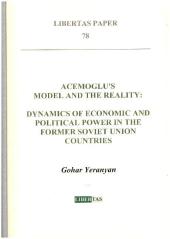 Neuerscheinungen 2013Stand: 2020-01-07 |
Schnellsuche
ISBN/Stichwort/Autor
|
Herderstraße 10
10625 Berlin
Tel.: 030 315 714 16
Fax 030 315 714 14
info@buchspektrum.de |

Gohar Yeranyan
Acemoglu´s Model and the Reality: Dynamics of Economic and Political Power in the Former Soviet Union Countries
2013. 45 S. 6. 21 cm
Verlag/Jahr: LIBERTAS-EUROPÄISCHES INSTITUT 2013
ISBN: 3-937642-46-3 (3937642463)
Neue ISBN: 978-3-937642-46-8 (9783937642468)
Preis und Lieferzeit: Bitte klicken
This study, based on a Master thesis at the American University of Armenia, deals with a model of the Turkish-American economist Acemoglu, and tries answers on questions like "Under which circumstances democracy can prevail?" in the former Soviet Union countries (FSU). Six of them have been selected for this "detective story" among the descriptions of transition: Armenia, Belarus, Kyrgyzstan, Moldova, Russia, Ukraine. But the models of public institutions and private groups´ behaviour are different from country to country, and the effects of transition sometimes contraproductive - be it under the "big bang" or under "gradualism". Gohar Yeranyan investigates systematically the functions of the elite, the oligarchs, the interest groups, the system-immanent changes, inequality, the revolutionary potential (end the evolutionary possibilities). the wealth distribution - and the persistence of political institutions. In this context, she discusses different paths of political developments in the FSU reality, possible reasons of democratization, as well as the dynamic model by D. Acemoglu - one of the most promising economists today, as well as the role of incentives for the political and economic change in former Soviet Union countries, before giving an overview of economic development paths of the FSU countries (shock therapy versus gradualism).
She is clearly pleading for a EU-approached democracy which is more likely than any other system to keep the different interest groups balanced, and can create more GDP and popular wealth which is not only restricted to an oligarchy. This includes also that the different dates should also follow an outspoken social policy. A very refreshing book (from the EU or a US perspective, for example) - and a very necessary one (from the FSU states´ view), and a very adequate one in view of the latest discussions in the EU´s Eastern Partnership countries.
Abstract.
Methodology
Introduction
Literature review
The different paths of political developments in the FSU reality
The possible reasons for democratization
The dynamic model by D. Acemoglu discussed for the FSU reality
The role of incentives for the political and economic change
The historical overview of economic development paths of the FSU countries
(shock therapy versus gradualism)
Findings
Analysis
Conclusions
Recommendations
References


